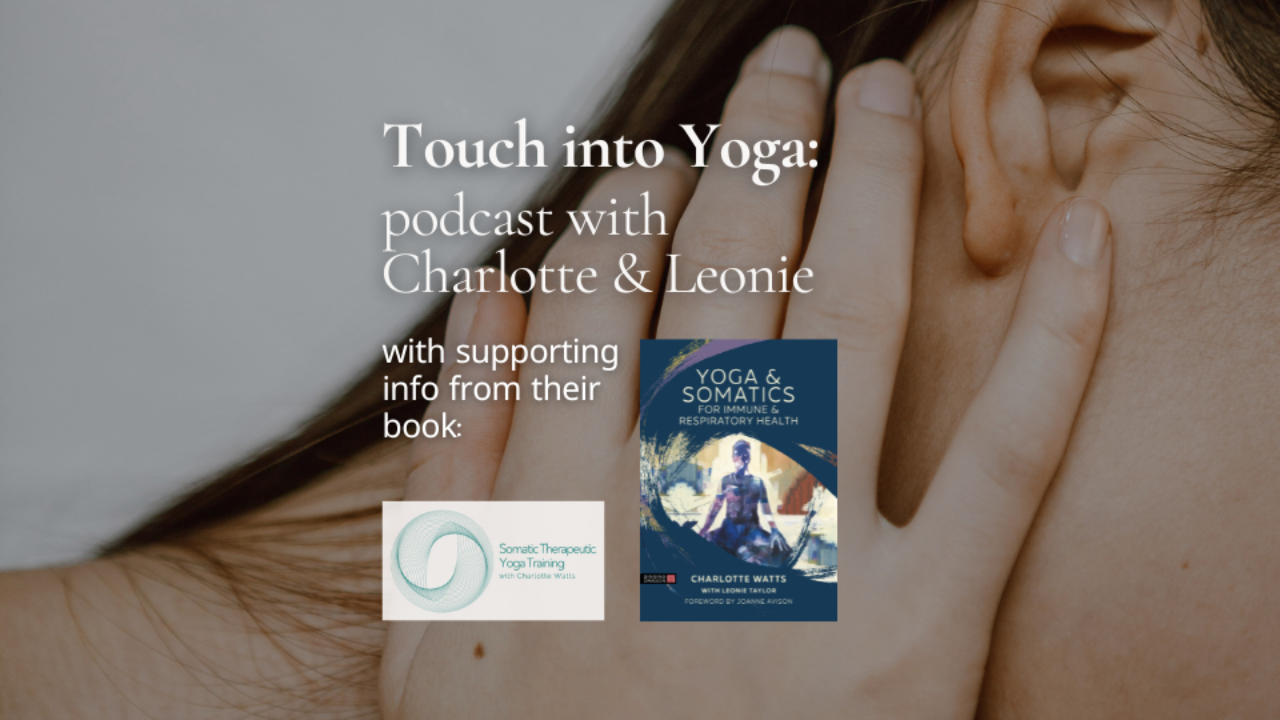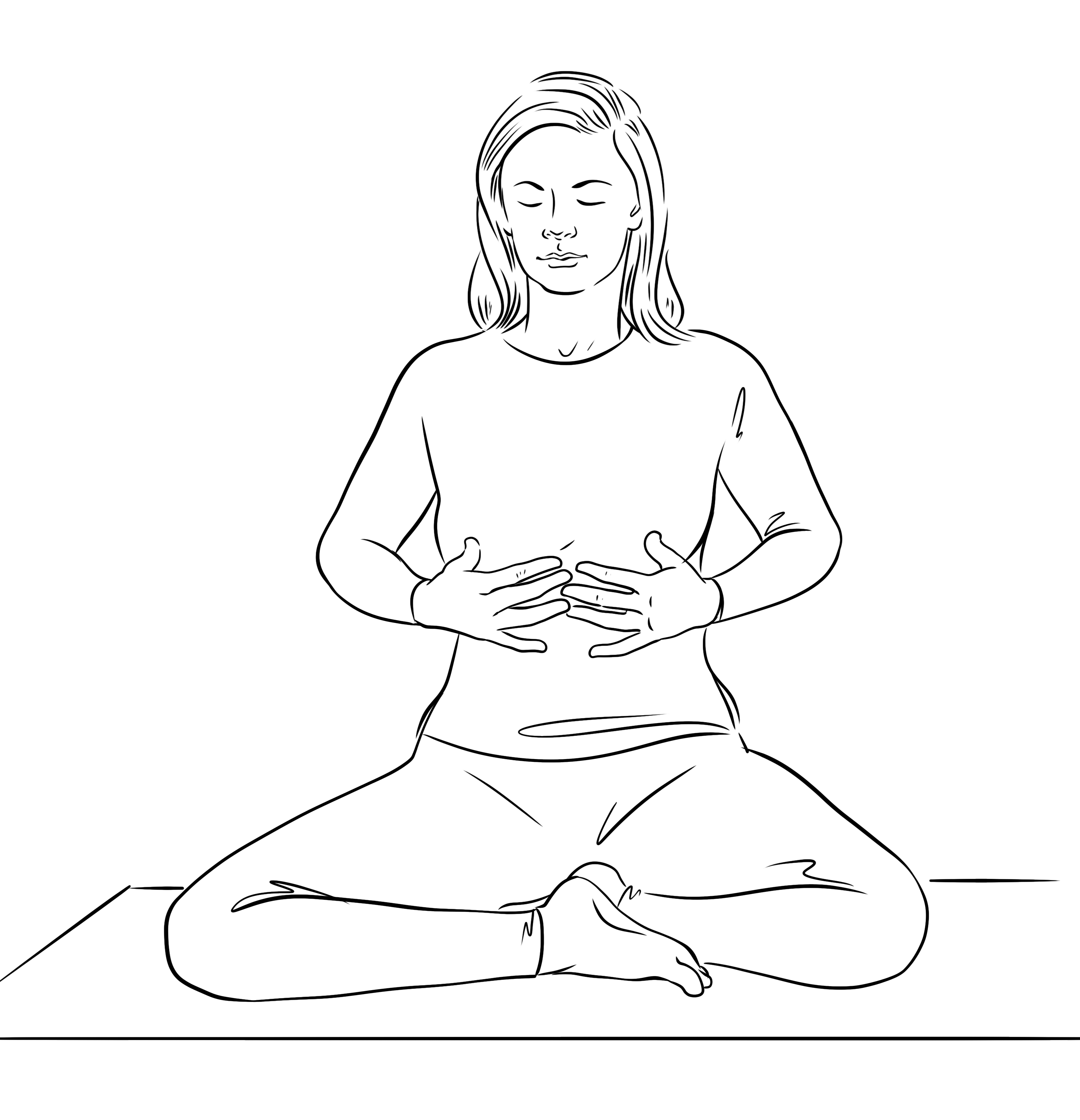Touch into Yoga - podcast with Charlotte & Leonie
Mar 14, 2025
This podcast is a discussion between Charlotte Watts and fellow yoga teacher and massage therapist Leonie Taylor, exploring the very real way in which we can guide students towards embodiment, reassurance, attunement and connection by including self-touch within yoga practice.
The information below supports the discussion and is taken from Charlotte and Leonie's book Yoga and Somatics for Immune and Respiratory Health.
 When we lose our sense of self through stress or trauma, touch can offer feeling and acknowledging a real sense of our edges via the skin. This helps us know where our internal world meets the external, creating a palpable sense of safety that ripples back through the whole nervous system. This connection through touch is crucial in a society dominated by visual and auditory input and such kinaesthetic communication is often under-valued. Indeed many may the feel the loss of not living within a physically and emotionally supportive extended family or tribe. We can feel this as a lack of safety in the gut-brain axis, often expressed as digestive and/or emotional issues. Touch brings us back into our bodies, our physicality. We are after all pack mammals – warm-blooded creatures that have evolved to respond with reward to actions that secure cohesion of the tribe.
When we lose our sense of self through stress or trauma, touch can offer feeling and acknowledging a real sense of our edges via the skin. This helps us know where our internal world meets the external, creating a palpable sense of safety that ripples back through the whole nervous system. This connection through touch is crucial in a society dominated by visual and auditory input and such kinaesthetic communication is often under-valued. Indeed many may the feel the loss of not living within a physically and emotionally supportive extended family or tribe. We can feel this as a lack of safety in the gut-brain axis, often expressed as digestive and/or emotional issues. Touch brings us back into our bodies, our physicality. We are after all pack mammals – warm-blooded creatures that have evolved to respond with reward to actions that secure cohesion of the tribe.
When we cannot touch others, self-soothing touch can be just as effective; rubbing, stroking, tapping, compression, even hands together at the heart or on the belly, has a powerful effect, evoking self-connection and compassion.
“The subcutaneous connective tissue has a special sensory system for touch that indicates affection. This system is connected to the brain and so influences our emotional state, empathy and interpersonal skills”.[1]
Another important aspect of autonomic release, touch releases oxytocin, the “love molecule”, creating the possibility of compassionate presence or ventral vagus mode. Oxytocin is released from the pituitary gland (3rd eye) in the brain after about 20 seconds of sustained touch (a too-quick hug doesn’t quite work!) which can help bring us down from anxious states. It is found to reduce levels of fear by reducing the activity of the amygdala, the (lower) mammalian centre of the brain responsible for detecting danger and reacting to perceived emergencies (including via the immune system). Touch also reduces stress hormones like cortisol and elevates mood so that we can experience safety, creativity, joy.
“We should not think of touch working by changing local tissue dynamics. There is much more going on. Touch can help us reconnect to, and in some cases change, primal experiences of how we created our sense of self.”[2]
The Tantric ritual, nyāsa (placing) of touch, or focus, also helps us create a proprioceptive map of the body. The rishi (seer) chants specific mantras to “place” at specific points on the body, uniting the individual with the divine. How we place the body in asana, pranayama or meditation, or where we direct mantras or visualise specific locations of the subtle body as an anchor, can help us bring focus to what is here and now, cutting through the noise of the mind.
References:
[1] Robert Schleip, Fascial Fitness, (North Atlantic Books, 2021)
[2] Steve Haines, Touch Is Really Strange (Singing Dragon, 2021)
If you'd like to study more on these mindful, somatic, therapeutic and trauma-informed practices that include touch and other embodied attention, see the courses: Somatics for Yoga Teachers and Yoga & Somatics for Healing & Recovery.
You can also experience Somatic & Mindful Yoga classes with both Charlotte and Leonie at the online membership Whole Health - you can experience a month free with the code WH100 (add to the coupon box at checkout; you can cancel anytime).
Stay connected with news and updates!
Join our community to receive the latest news and updates from Somatic Therapeutic Yoga Training Limited. When you sign up, you'll also receive access to our Yoga Teacher Community and receive two ebook samples of my recent Yoga Teacher training books.
Don't worry, your information will not be shared.
We hate SPAM. We will never sell your information, for any reason.

